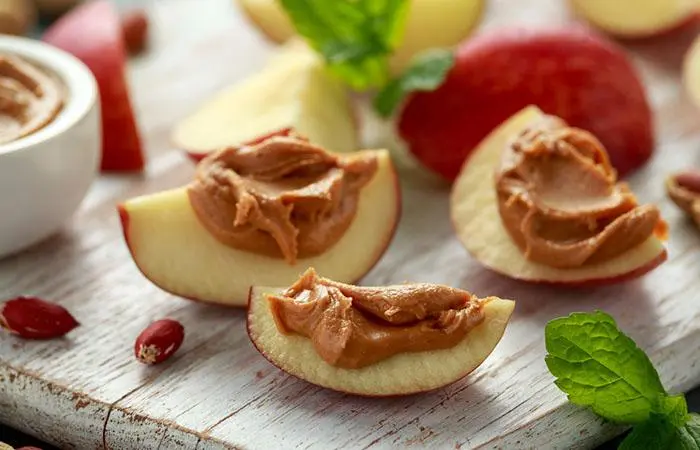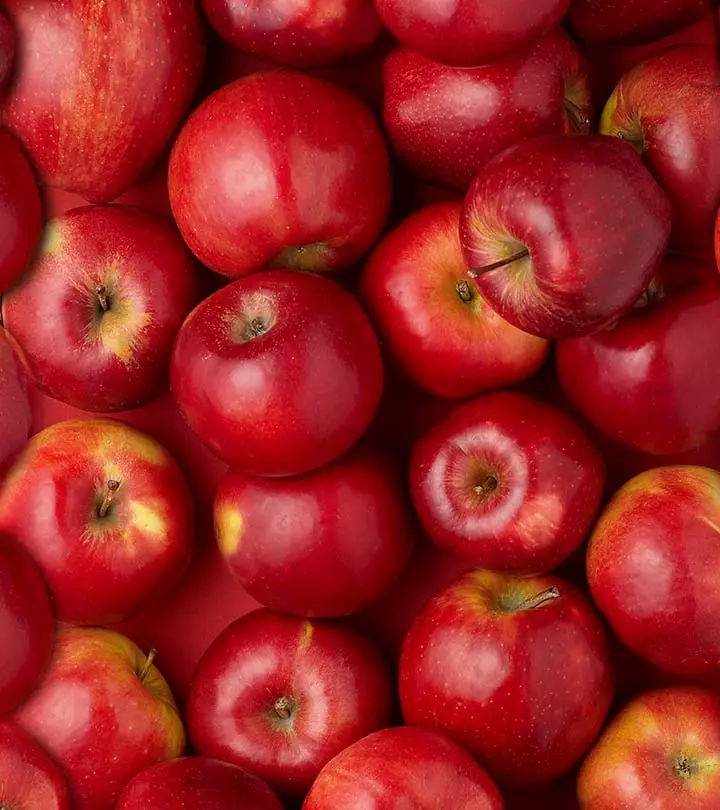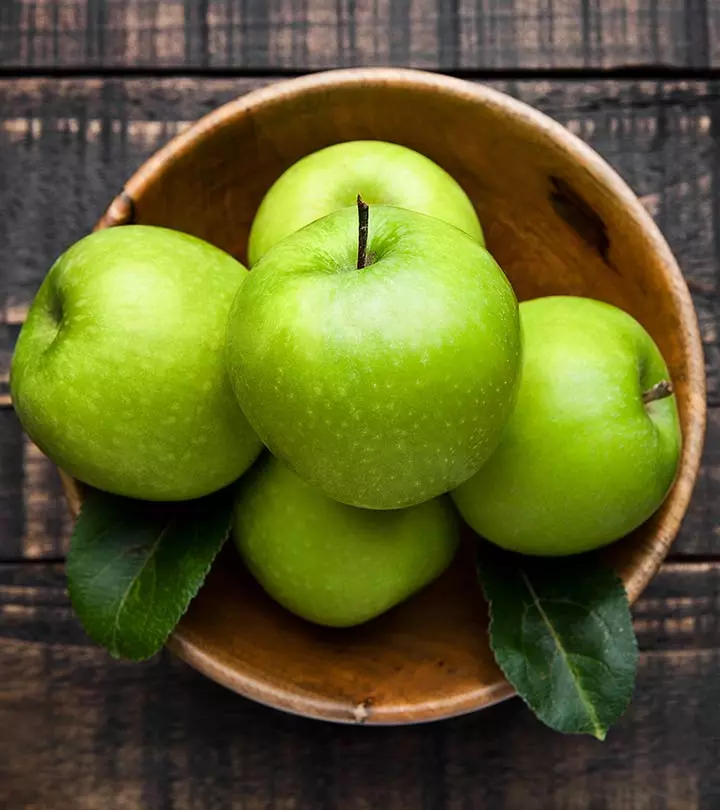Are Apples Good For Weight Loss? Surprising Health Benefits
Bite into the truth to learn if the fruit is a sweet success or a fleeting fad.

Image: Shutterstock
Ever since Snow White bit into that fateful apple, we have been fascinated by these crisp fruits. But are apples good for weight loss? Can they help us with the impertinent modern-day quest of shedding some pounds? This humble fruit, often found in lunchboxes and on kitchen counters worldwide, packs a powerful punch when it comes to aiding weight loss. They are low in calories and high in fiber and also provide essential vitamins and minerals that support overall health. In this article, we understand if an apple can truly be a friend on our weight loss journey. Keep reading!
In This Article
Nutritional Value Of Apples
A single apple boasts a wealth of vitamins and minerals, including vitamin C, potassium, and even some B vitamins (1).
Apples contain about 85.6 grams of water per 100 grams and are incredibly hydrating. They offer a modest 52 calories, making them a low-calorie snack high in dietary fiber (2.4 grams per serving) (1).
Apples contain natural sugars, including sucrose, glucose, and fructose. Thus, you can have an apple to obtain a quick energy boost without the crash caused by processed sugars (1).
 Trivia
TriviaOverall, apples offer a nutritional punch that can be a valuable addition to a balanced diet. Their excellent nutritional profile makes them a potential ally in your weight loss journey. Let us understand why in the next section.
Key Takeaways
- Apples are low in calories and high in fiber, vitamins, and minerals.
- Eating whole apples, especially with the skin, maximizes dietary fiber intake.
- They promote satiety and aid digestion, which helps reduce overall calorie intake.
- Consuming one to two apples daily as part of a balanced diet and enjoying them as mid-morning or mid-afternoon snacks can effectively support weight management.
Are Apples Good For Weight Loss?

Apples are packed with beneficial components like fiber, antioxidants, and carotenoids. These compounds work together to help with weight management.
Studies on cells, animals, and even people have shown that apples can help you shed pounds. Antioxidants in apples fight harmful free radicals that contribute to obesity, while the other components in apples regulate genes and cell communication, particularly in fat tissue, promoting metabolism. This amazing teamwork may explain why apples seem to prevent weight gain (2).
Researchers at the State University of Rio de Janeiro, Brazil, found that overweight women who ate apples and pears as part of their diet lost an average of 1.22 kilograms (2.6 lbs) over 12 weeks, compared to a smaller weight loss in a group consuming oat cookies. The study suggested that fruit intake, such as apples, may contribute to weight loss more effectively than oat-based snacks (3).
YouTuber Jade decided to take on the five-day apple diet challenge, intrigued by the possibility of losing ‘anywhere from five to ten pounds’. She documented her journey, starting with two apples for lunch and mentioning, “I did not think I was gonna feel it already, but I’m hungry (i).” By the end, Jade reported, “I lost four pounds, but I’m sure that’s not all fat.”
According to a study based on data from the National Health and Nutrition Examination Survey (NHANES) 2003–2010, apple consumption is linked to better diet quality and a reduced risk of obesity in children (4).
The study, which included 13,339 children aged 2-18, found that those who consumed apples in various forms, such as whole apples, apple sauce, and 100% apple juice, had significantly higher Healthy Eating Index-2010 (HEI) scores compared to non-consumers. This means these children were likely consuming more nutritious foods and following healthy eating recommendations (4).
Also, those who ate apples (whole, applesauce, or juice) had a lower BMI (a measurement of weight relative to height). Impressively, kids who enjoyed whole apples were 30% less likely to be obese compared to those who did not (4).
Science is starting to peel back the layers on why apples might be beneficial for weight management. Keep reading to understand the reasons why incorporating them into your diet could be a smart move for weight loss.
Reasons Why Apples Are Weight Loss-Friendly
Apples are remarkably weight-loss-friendly for several reasons, making them an excellent addition to any diet aimed at shedding pounds. Here are the major ones:
1. Are Low In Calories
A medium-sized apple typically contains around 52 calories (1). This modest caloric contribution allows for their incorporation into a weight-loss diet without exceeding daily calorie goals. Thus, it is a perfect snack for those looking to shed pounds without sacrificing flavor or satisfaction.
2. Contain High Fiber
A significant contributor to apples’ weight-loss potential is their high dietary fiber content. This fiber is present in both soluble and insoluble forms. It is particularly concentrated in the peel, boasting roughly 2-3 times more fiber than the flesh. It increases satiety, helping you feel full longer and reducing overall calorie intake (5).
One key component of apple fiber, pectin, plays a particularly valuable role. Studies have shown that pectin can delay gastric emptying, potentially contributing to weight management and lower blood lipid levels (5).
3. Are A Low-Glycemic Food
Unlike sugary snacks that cause rapid spikes in blood sugar, apples rank low on the glycemic index (GI). In other words, they cause a more gradual rise in blood sugar levels after consumption. Studies suggest that consuming apples before a meal, particularly for those with impaired glucose tolerance, can significantly reduce the peak blood sugar rise compared to consuming high-glycemic alternatives. This steadier blood sugar response can contribute to managing cravings and potentially reducing overall calorie intake (6), (7).
4. Are High In Fluids
Apples have approximately 85% water content (1). Therefore, consuming apples helps keep the body hydrated. The combination of water and dietary fiber in apples promotes a feeling of fullness, reducing the likelihood of overeating. This makes apples a satisfying snack choice that can help you control calorie intake effectively.
5. Are Rich In Antioxidants
Apples exhibit potent antioxidant properties that combat oxidative stress and inflammation in the body. This is possible due to the presence of phytochemicals like quercetin, catechin, and chlorogenic acid. Have an apple and harness these antioxidant benefits to enhance metabolism, support immune function, and maintain vitality. These functions contribute to effective weight management and overall well-being (8).
6. May Boost Metabolism
Research suggests that apples may positively influence metabolic processes related to weight management. This potential benefit is attributed to their high fiber content, particularly pectin. Upon reaching the large intestine, pectin interacts with the community of beneficial gut bacteria. This may contribute to the modulation of fat processing within the body and potentially lead to improved overall metabolic function (9).
7. May Improve Digestion

Beyond keeping you feeling full, apples might also give your digestion a boost, potentially aiding weight management. Fiber promotes satiety and regulates food passage, helping you feel fuller for longer. Organic acids like malic acid assist in breaking down food and nutrient absorption (10).
8. May Improve Satiety
Studies have shown that whole apples, compared to applesauce or apple juice (even with added fiber), lead to a greater feeling of fullness and a reduction in food intake at the following meal. This enhanced satiety is likely due to the combined effects of the apple’s structure and its high fiber content, which triggers fullness signals in the brain (11).
 Pro Tip
Pro Tip9. Are A Convenient Snack
Busy lives can make healthy snacking a challenge. Apples come to the rescue as a convenient and weight-loss-friendly option. They require no prep work, are easy to carry, and stay fresh for several days at room temperature. This grab-and-go quality makes them a perfect choice for satisfying hunger pangs between meals without derailing your weight management efforts.
 Pro Tip
Pro TipThe reasons why apples are a great choice for weight management are intricately linked to their overall health benefits. From promoting heart health to potentially reducing cancer risk with their antioxidants, apples offer a delicious package of benefits that extend far beyond weight loss. Scroll through to discover them!
Other Health Benefits Of Apples
While apples shine for weight management, their benefits extend far beyond the scale. Here are some of the benefits:
1. May Help People With Diabetes
Apples appear to be a particularly diabetes-friendly fruit choice. A large study published in the journal BMJ involving over 187,000 participants found a significant association between consuming specific whole fruits and a reduced risk of type 2 diabetes. Apples, alongside blueberries and grapes, showed the strongest link to a lower diabetes risk. This highlights the potential benefits of incorporating whole fruits, like apples, into your diet (12).
2. May Boost Heart Health

Apples also offer a heart-healthy advantage. Research suggests that regularly incorporating whole apples into your diet may be associated with a reduced risk of cardiovascular disease (CVD). Studies indicate that apple consumption may help lower blood pressure, cholesterol levels, and inflammation markers, while potentially increasing good cholesterol (13).
3. May Boost Brain Health
Studies suggest that certain compounds found in apples, like quercetin, might play a role in promoting the growth of new brain cells (neurogenesis). Thus, apple consumption may support cognitive function and overall brain health (14).
4. May Lower The Risk Of Cancer
A large-scale analysis examining various studies found a potential association between apple consumption and a reduced risk of certain cancers. The study highlights a possible link to lung cancer reduction, with the highest apple intake group experiencing a statistically significant 11% decrease in risk compared to the lowest intake group (15).
Thus, apples are an effective tool to support your weight management goals. But how can you maximize the apple’s benefits for weight loss? Keep reading to learn more!
How To Eat Apples For Weight Loss

When it comes to apples and weight loss, the way you eat them matters. You should definitely know about the apple diet for weight loss to further enrich your eating regime. Studies suggest that whole apples, rather than juiced or pureed versions, promote greater satiety (11).
It is advisable to consume the apple whole, including the skin, where much of the fiber is concentrated. Chewing the apple slowly and mindfully can enhance the feeling of fullness and satisfaction. This reduces the urge to snack on less healthy options later.
It is important to note that there is not a single ‘best’ apple variety for weight loss. Most varieties offer a good source of fiber and essential nutrients. However, some, like Granny Smith apples, are lower in sugar content compared to sweeter varieties like Fuji or Gala. The key is to choose apples you enjoy, as this promotes long-term dietary adherence.
 Trivia
TriviaIn terms of quantity, the general recommendation is to consume one to two apples per day as part of a balanced diet for weight loss. Eat them in conjunction with a variety of other fruits and vegetables to ensure a well-rounded diet that meets all nutritional needs.
Strategic food pairings can further enhance weight management benefits of apples. Including a moderate amount of natural peanut butter with apple slices can be a valuable strategy. Peanut butter offers a source of protein and healthy fats, which can contribute to increased satiety alongside the fiber content within the apple (16).
The timing of apple consumption can also play a role in weight loss efforts. Eating an apple as a mid-morning or mid-afternoon snack can help curb hunger between meals and prevent overeating during main meals.
Remember, apples can help with weight management, but they should be incorporated within a strategy that includes a balanced diet and regular physical activity. Consult a registered dietitian or healthcare professional for personalized guidance in your weight loss journey. If you want an idea of what your meals might look like on apple diet, check out the sample plan below.
A Typical Day’s Plan When On Apple Diet For Weight Loss
Here’s a sample apple diet plan for weight loss for a day:
Breakfast
– One whole apple (preferably Granny Smith for lower sugar)
– A small bowl of oatmeal or a protein-rich breakfast
Mid-Morning Snack
– One apple, sliced, with a small spoon of natural peanut butter
Lunch
– A large salad with leafy greens and vegetables with a whole apple on the side
– Add some lean protein like chicken or tofu for extra fullness
Dinner
– A balanced meal with grilled fish or chicken, steamed veggies, and a small portion of quinoa or brown rice
– Half an apple for dessert
While incorporating apples into your weight loss plan offers a multitude of benefits, it is important to be aware of potential side effects, especially for those with certain sensitivities.
Side Effects Of Apples To Be Wary Of

Here are a few potential side effects you may observe if you are regularly having apples:
1. Dental Erosion
- The high acidity of some apple varieties, particularly Granny Smith, can contribute to tooth enamel erosion if consumed frequently and without proper oral hygiene practices (17).
- Rinsing your mouth with water after eating apples and brushing regularly can help mitigate this risk.
2. Bowel Obstruction
- In rare cases, excessive consumption of dried apples, particularly if not adequately rehydrated, can lead to small bowel obstruction.
- Dried apples can absorb significant amounts of fluid and expand in size, potentially causing blockage within the digestive system (18).
3. Food Triggers For Migraine And IBS
- For some individuals with migraine or Irritable Bowel Syndrome (IBS), apples may act as a trigger for their condition (19).
- If you experience migraine or IBS flare-ups after consuming apples, consider consulting a healthcare professional to discuss potential food sensitivities.
4. Pesticide Exposure
- Apples may contain trace amounts of pesticide residue (20).
- Washing apples thoroughly and peeling them can significantly reduce this concern.
5. Apple Allergies
- Although rare, some people may be allergic to apples, especially those who are allergic to birch pollen. Symptoms may range from mild skin irritation to more severe reactions (21).
- If you experience any discomfort after eating apples, consult a healthcare professional for a proper diagnosis.
So, to answer the question, are apples good for weight loss, concisely, one can say yes, they can be a valuable ally on your weight loss journey. Their properties can promote weight management in several ways. They can keep you feeling full for longer, potentially reducing calorie intake throughout the day. Additionally, research suggests apples may influence metabolism and even blood sugar levels, further supporting weight loss efforts. For optimal results, enjoy apples as a mid-morning or mid-afternoon snack to curb hunger between meals and prevent overeating. Remember, for optimal results, incorporate apples into a balanced diet and regular physical activity routine. However, there are more benefits of apples. From boosting heart and brain health to reducing acne, these miraculous fruits provide a compelling reason to incorporate them into your diet.
Frequently Asked Questions
Do apples burn belly fat?
Apples may not specifically target belly fat, but their fiber content can keep you feeling full and potentially reduce calorie intake, aiding weight management.
Are pink lady apples good for weight loss?
Yes. Pink lady apples, like most apples, are a good source of fiber and low in calories, making them a suitable snack for weight loss plans.
Are dried apples good for weight loss?
Possibly. Dried apples are a concentrated source of fiber and nutrients, but also contain concentrated sugar. They can be part of a weight loss plan, but portion control is crucial.
Are red apples good for weight loss?
Yes, apples are good for weight loss. The specific color of the apple does not have any connection to its nutrient content and weight loss effects.
Can a three-day apple cleanse truly detoxify the body, or is it just a recipe for a hanger? Watch the following video to see if eating only apples for three days can help with weight loss.
Personal Experience: Source
StyleCraze's articles are interwoven with authentic personal narratives that provide depth and resonance to our content. Below are the sources of the personal accounts referenced in this article.
(i). 5 Day Apple Diet | Lose 10 Pounds in a Week?https://www.youtube.com/watch?v=eQ7DDNfPfvA&ab_channel=JADE%E2%80%99SEXISTENCE
References
Articles on StyleCraze are backed by verified information from peer-reviewed and academic research papers, reputed organizations, research institutions, and medical associations to ensure accuracy and relevance. Read our editorial policy to learn more.
- Apples raw with skin (Includes foods for USDA’s Food Distribution Program)
https://fdc.nal.usda.gov/food-details/171688/nutrients - Weight Loss Associated With Consumption of Apples: A Review
https://pubmed.ncbi.nlm.nih.gov/29630462/ - Weight loss associated with a daily intake of three apples or three pears among overweight women
https://pubmed.ncbi.nlm.nih.gov/12620529/ - Consumption of apples is associated with a better diet quality and reduced risk of obesity in children: National Health and Nutrition Examination Survey (NHANES) 2003–2010
https://www.ncbi.nlm.nih.gov/pmc/articles/PMC4443546/ - Does an apple a day keep away diseases? Evidence and mechanism of action
https://docs.google.com/document/d/1lz0Q96VrOzOll6nD5uj9OyypyfADnHNEwB5_QOyWtSM/edit - Effect of Apple Consumption on Postprandial Blood Glucose Levels in Normal Glucose Tolerance People versus Those with Impaired Glucose Tolerance
https://www.ncbi.nlm.nih.gov/pmc/articles/PMC9223382/ - Apple Preload Halved the Postprandial Glycaemic Response of Rice Meal in Healthy Subjects
https://www.ncbi.nlm.nih.gov/pmc/articles/PMC6950014/ - Apple phytochemicals and their health benefits
https://www.ncbi.nlm.nih.gov/pmc/articles/PMC442131/ - Apples and Cardiovascular Health—Is the Gut Microbiota a Core Consideration?
https://www.ncbi.nlm.nih.gov/pmc/articles/PMC4488768/ - “An apple a day keeps the doctor away”: The potentials of apple bioactive constituents for chronic disease prevention
https://www.ncbi.nlm.nih.gov/pmc/articles/PMC9321083/ - The effect of fruit in different forms on energy intake and satiety at a meal
https://www.ncbi.nlm.nih.gov/pmc/articles/PMC2664987/ - Fruit consumption and risk of type 2 diabetes: results from three prospective longitudinal cohort studies
https://www.ncbi.nlm.nih.gov/pmc/articles/PMC3978819/ - The effects and associations of whole-apple intake on diverse cardiovascular risk factors. A narrative review
https://pubmed.ncbi.nlm.nih.gov/31928209/ - Apple Peel and Flesh Contain Pro-neurogenic Compounds
https://www.ncbi.nlm.nih.gov/pmc/articles/PMC7940132/ - Apple intake and cancer risk: a systematic review and meta-analysis of observational studies
https://www.ncbi.nlm.nih.gov/pmc/articles/PMC10270999/ - The Effect of a Peanut-Enriched Weight Loss Diet Compared to a Low-Fat Weight Loss Diet on Body Weight Blood Pressure and Glycemic Control: A Randomized Controlled Trial
https://www.ncbi.nlm.nih.gov/pmc/articles/PMC9318508/ - Dental erosion caused by Granny Smith apples: An evidence‐based case report and 1‐year follow‐up
https://www.ncbi.nlm.nih.gov/pmc/articles/PMC6132154/ - Small bowel obstruction caused by dried apple
https://www.ncbi.nlm.nih.gov/pmc/articles/PMC4430109/ - Distinct Food Triggers for Migraine Medication Overuse Headache and Irritable Bowel Syndrome
https://www.ncbi.nlm.nih.gov/pmc/articles/PMC10607881/ - Cumulative health risk assessment of pesticide residues in apple products in the Northwest of Iran using Monte Carlo simulation
https://pubmed.ncbi.nlm.nih.gov/37428849/ - Apple allergy: Causes and factors influencing fruits allergenic properties–Review
https://www.ncbi.nlm.nih.gov/pmc/articles/PMC8171779/
Read full bio of Tracy Tredoux
Read full bio of Payal Karnik
Read full bio of Ravi Teja Tadimalla
Read full bio of Sindhu Koganti



























Community Experiences
Join the conversation and become a part of our empowering community! Share your stories, experiences, and insights to connect with other beauty, lifestyle, and health enthusiasts.